This is the fifth and final edition in our series of articles looking at the international education market in Canada by province. In this article, I’ll be analysing trends in study permits issued in Canada’s Atlantic provinces: New Brunswick, Newfoundland and Labrador, Nova Scotia, and Prince Edward Island (PEI). In previous blog posts, I’ve covered study permit trends in Ontario, Quebec, British Columbia, and the Prairie provinces.
Here’s what today’s ApplyInsights will include:
- A comparison of study permit trends in Atlantic Canada and Canada’s other regions
- A breakdown of study permits issued in each Atlantic province
- Top source countries for study permits issued in the Atlantic provinces
- A summary of my findings and my thoughts about the future
Full-year 2020 provincial data isn’t available yet, so throughout this article, I’ll be using data for new study permits issued in 2018, 2019, and January through October 2020.1
Let’s first take a look at how international student enrollment in the Atlantic provinces compares to the rest of Canada.
Atlantic Canada vs. All of Canada Study Permits Issued
In 2020, Atlantic Canada accounted for 3.7% of all new Canadian study permits issued. In contrast, new international students to Atlantic institutions were issued 5.7% and 5.5% of all new study permits in 2018 and 2019, respectively.
Prior to this pandemic-related decline, Atlantic Canada was a growing market. From 2018 to 2019, the total number of new study permits issued to international students attending schools in Atlantic Canada rose by 6.3%.
The following table shows how the number of new study permit applications and the number of new study permits issued changed between 2018, 2019, and the first ten months of 2020:
| Region | 2018 | 2019 | 2020 | % Change, 18–19 | % Change, 19–20 | |
|---|---|---|---|---|---|---|
| Study Permit Applications | Atlantic Canada | 21,825 | 26,172 | 4,043 | +20.0% | -84.6% |
| All of Canada | 342,652 | 426,065 | 89,143 | +24.3% | -79.1% | |
| Study Permits Issued | Atlantic Canada | 12,239 | 13,010 | 1,664 | +6.3% | -87.2% |
| All of Canada | 215,869 | 238,413 | 45,312 | +10.4% | -81.0% |
Atlantic Canada saw the largest regional decline in new study permits as a result of COVID-19 (-87.2%). The next largest drop was in the Prairie provinces, at -86.4%. But institutions in the Atlantic provinces should remain optimistic for post-pandemic recovery. The number of new study permit applications for Atlantic schools increased 20% from 2018 to 2019. While student travel has been put on hold for now, the underlying trends suggest Atlantic Canada has the potential for big growth in 2021 and beyond.
Atlantic Canada Study Permits Issued by Study Level
Like many Canadian regions, Atlantic Canada’s 2019 study permit growth came largely from increasing college enrollment. New study permits issued to college students in the Atlantic provinces grew 53.1% from 2018 to 2019. Study permits issued to university students (+9.6%) and primary and secondary students (+1.1%) grew as well. Study permits for Other Studies2 students declined (-24.4%) year-over-year.
The figure below shows the number of study permits issued between 2018 and 2020 to students attending schools in Atlantic Canada, broken down by study level:

The pandemic has had a non-uniform impact on institutions in Atlantic Canada. Study permits for college and university studies both fell by 90% in the first ten months of 2020, while study permits for primary and secondary students dropped only 80%. As a result, the market share of the combined college and university sectors dropped substantially (-11.2%), to the sole benefit of the primary and secondary sector (+11.2%).
Atlantic Canada Study Permits Issued by Province
How did these declines impact each Atlantic province? The chart below shows the number of new study permits issued to international students at Atlantic institutions from 2018 to 2020 (Jan–Oct):

Let’s dive a little deeper into each province individually.
New Brunswick
New Brunswick was the second most popular Atlantic destination for international students from 2018 to October 2020. Institutions in New Brunswick achieved strong new study permit growth between 2018 and 2019, increasing 15.6% year-over-year. This growth was driven by growing interest in college studies. From 2018 to 2019, new study permits issued to New Brunswick college students rose 74%. The pandemic caused an average decline of 84.1% in new study permits for New Brunswick schools from 2019 to Jan–Oct 2020.
Newfoundland and Labrador
Newfoundland and Labrador experienced the best growth, and sharpest decline, among Atlantic provinces from 2018 to October 2020. From 2018 to 2019, new study permits issued for institutions in Newfoundland and Labrador increased by 22.3%. As in New Brunswick, this growth was led by college students. New study permits for Newfoundland and Labrador college students increased an incredible 230% from 2018 to 2019. In the first ten months of 2020, study permits for college students declined 94.3% year-over-year. Across all sectors, study permit numbers dropped 90% between 2019 and 2020 for schools in Newfoundland and Labrador.
Nova Scotia
Nova Scotia was the most popular destination for international students among the Atlantic provinces between 2018 and October 2020. The number of new study permits issued to students at Nova Scotia institutions surpassed the total for the other three provinces combined in 2018 and 2019. But Nova Scotia did not benefit from the college boost its Atlantic neighbours saw. Study permits for all study levels increased only 2.1% from 2018 to 2019, and university remained the main draw for international students. New university students accounted for 56% of all new study permits issued for Nova Scotia schools in 2019. Pandemic travel restrictions for international students led to a 88.7% decrease in new study permits in the first ten months of 2020.
Want to know more about international education in Nova Scotia? Check out our upcoming Canada Coast-to-Coast: Nova Scotia webinar, featuring Acadia University, Cape Breton University, and Mount St. Vincent University discussing their programs, admissions, scholarships, and much more!
Prince Edward Island (PEI)
PEI was the only Atlantic province to experience study permit decline from 2018 to 2019, dropping 8.7% over that period. This was caused by a 21% decline in new study permits for primary and secondary students, along with a 48% decrease in new study permits for Other Studies students. A strong increase in new college students (+28.5%) helped offset these declines. But institutions in PEI have also shown high resilience in light of the pandemic. New study permits for PEI schools declined only 83.4% from 2019 to October 2020. Like Newfoundland and Labrador, PEI colleges were the hardest hit, with new study permits for college students dropping 92.5% from 2019.
Top Source Countries for Atlantic Province Students, 2018–2020
What are the largest source markets for international students to Atlantic province schools? Let’s take a look at the top six source markets over the 2018 to October 2020 period.
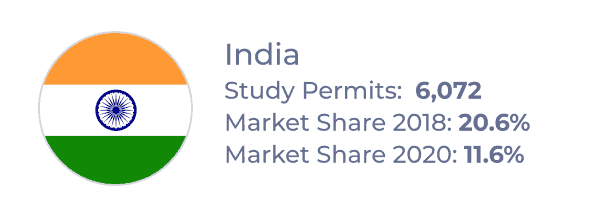
India was the primary source for new international students to Canadian institutions in 2018, 2019, and the first ten months of 2020. In 2019 alone, over 111,000 study permits were issued to Indian nationals. Only around 3% of these students attended schools in Atlantic Canada. But those Indian students accounted for 25.0% of the new international student population at Atlantic institutions in 2019. Though this rate fell to 11.6% in 2020, I’m optimistic that it will rebound post-pandemic. This would undoubtedly be good news for Cape Breton University (CBU), the top Atlantic school for Indian students over the past three years. CBU accounted for 40.8% of all new study permits issued to Indian nationals for Atlantic province studies in 2019.
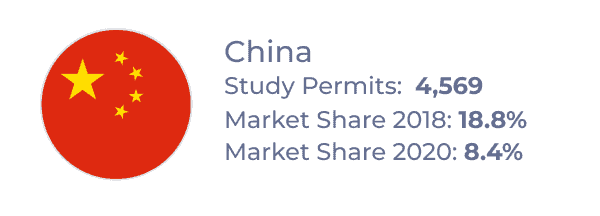
China was the second largest source market for international students to Atlantic institutions in 2018, 2019, and January to October 2020. But the pandemic had a significant impact on Chinese student numbers in 2020. The number of study permits issued to Chinese nationals for Atlantic schools fell by 93.2% in 2020. This dropped the overall market share for Chinese students from 15.6% in 2019 to 8.4% in 2020. Dalhousie has been the most popular Atlantic school for Chinese students over the past five years. In 2018 and 2019, Dalhousie accounted for 20% of all new study permits issued to Chinese nationals.
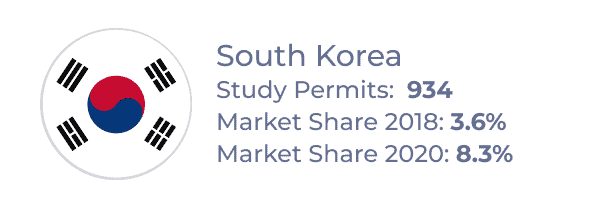
South Korea was the seventh largest source market for Atlantic schools in 2019, with a 3.6% market share. However, South Korea became the third largest source market for Atlantic schools in 2020, with a market share of 8.3%. This jump masks the fact that new South Korean student populations were declining in Atlantic Canada pre-pandemic. From 2018 to 2019, study permits for South Korean nationals dropped 27.0%. Their below-average pandemic decline of 58.9% in 2020 showed high market resiliency, but it’s less likely that this mature market will rebound significantly in 2021 and beyond.
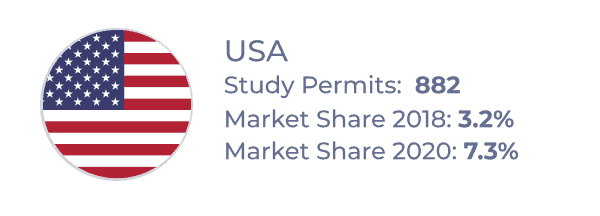
The US market also showed high resiliency in the first ten months of 2020, likely due to its close proximity to Canada. The US went from the sixth largest to the fourth largest source market for new international students at Atlantic schools between 2019 and 2020. Like South Korea, the US market had been trending down pre-pandemic. A 66.4% decrease in 2020 followed a 10.2% decline in 2019, amounting to a 75% total drop since 2018. One Atlantic university saw only a 12% decline in new study permits for US students in 2020 over 2019: the University of Prince Edward Island (UPEI). UPEI was the top Atlantic school, and the eighth most popular destination overall, for US students in 2020.
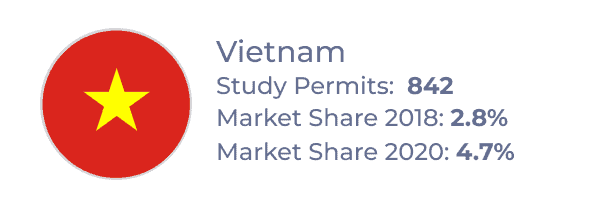
Vietnam dropped from the fourth largest to the fifth largest source market for international students to Atlantic institutions between 2019 and January through October 2020. From 2018 to 2019, the number of new study permits issued to Vietnamese nationals for Atlantic schools rose 17.7%. But this was followed by a decline of 81.1% in 2020. CBU bore the brunt of this decrease, experiencing a 93.7% drop in study permits for Vietnamese students in 2020 compared to 2019.
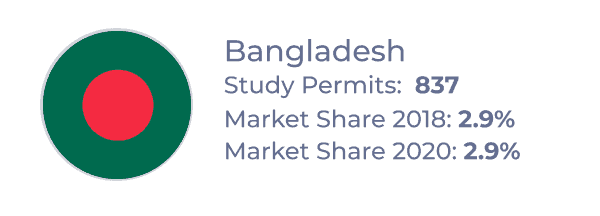
Bangladesh held on to a top spot among source markets for international students to Atlantic institutions, despite an 88.4% decline from 2019 to the first ten months of 2020. Before the pandemic, Atlantic Canada had been a growing destination for Bangladeshi students. 17.7% more study permits were issued to Bangladeshi nationals for Atlantic schools in 2019 compared to 2018. I’m confident the Bangladeshi market will recover well post-pandemic, which will certainly benefit the Memorial University of Newfoundland (MUN). MUN has been a top five destination among all Canadian schools for students from Bangladesh since 2016.
Other Notable Source Markets
There are a few source markets outside of the top six that will be worth watching post-pandemic. The Philippines saw a 79.7% increase in new study permits for Atlantic institutions between 2018 and 2019. 39.2% more Iranian students were issued study permits for Atlantic schools over the same period. But the most substantial source market growth was Ghana, as 200% more Ghanian nationals received study permits for studies in Atlantic Canada in 2019 than in 2018. These Ghanian students studied throughout Atlantic Canada, with many attending MUN, UPEI, and Mount Saint Vincent University.
The Future of International Education in Atlantic Canada
Institutions in Atlantic Canada will need to ensure they are well positioned to recover and attract new international students once the COVID-19 pandemic is behind us. Atlantic Canada was the smallest regional market for students studying abroad pre-pandemic. It’s also seen a higher-than-average decline in the first ten months of 2020.
Many Atlantic provinces have already developed and rolled out international student programs (ISPs) that specifically target primary and secondary students. These include the New Brunswick ISP, the Nova Scotia ISP, and the PEI ISP. The Atlantic provinces have also put government support behind other programs targeting graduating international students at Atlantic institutions, such as Atlantic Canada Study and Stay. The Canadian government has contributed as well, committing to making the Atlantic Immigration Pilot a permanent program.
But innovative ideas, collaborative effort, and regional advertising are needed to ensure schools in Atlantic Canada remain competitive post-pandemic. Nova Scotia’s EduNova is a great example of institutions working together to reach more international students and to provide greater support to their student communities. Many students are attracted to Atlantic institutions by lower tuition fees compared to other Canadian schools. But they are often unaware that the permanent residency (PR) pathway in Atlantic Canada is more accessible than in other provinces due to reduced Provincial Nominee program requirements. Targeted and unified recruitment efforts by Atlantic institutions will be critical to ensure students see the Atlantic provinces as desirable study, and immigration, destinations.
As the dust settles around the COVID-19 pandemic, I’m hopeful that the international student market for Atlantic Canada will recover quickly. We at ApplyBoard will work with our partner schools in New Brunswick, Newfoundland and Labrador, Nova Scotia, and Prince Edward Island to enable strong recovery in 2021 and beyond.
Thank you for joining ApplyInsights on our cross-Canada journey!
Published: March 15, 2021
Subscribe to ApplyInsights
Sign up for the latest insights on international education.
 Meti Basiri
Meti Basiri
Co-Founder and Chief Marketing Officer (CMO)
Meti is driven by the belief that education is a right, not a privilege. He leads the International Recruitment, Partner Relations, and Marketing teams at ApplyBoard, working to make education accessible to people around the world. Meti has been instrumental in building partnerships with 1,500+ educational institutions across Canada, the United, the United Kingdom, and Australia. Working with over 5,000 international recruitment partners, ApplyBoard has assisted over 150,000 students in their study abroad journey. Follow Meti on LinkedIn for more access to ApplyInsights and key industry trends.
FOOTNOTES:
1. All data courtesy of Immigration, Refugees and Citizenship Canada (IRCC).
2. Includes language training programs and other study programs.



